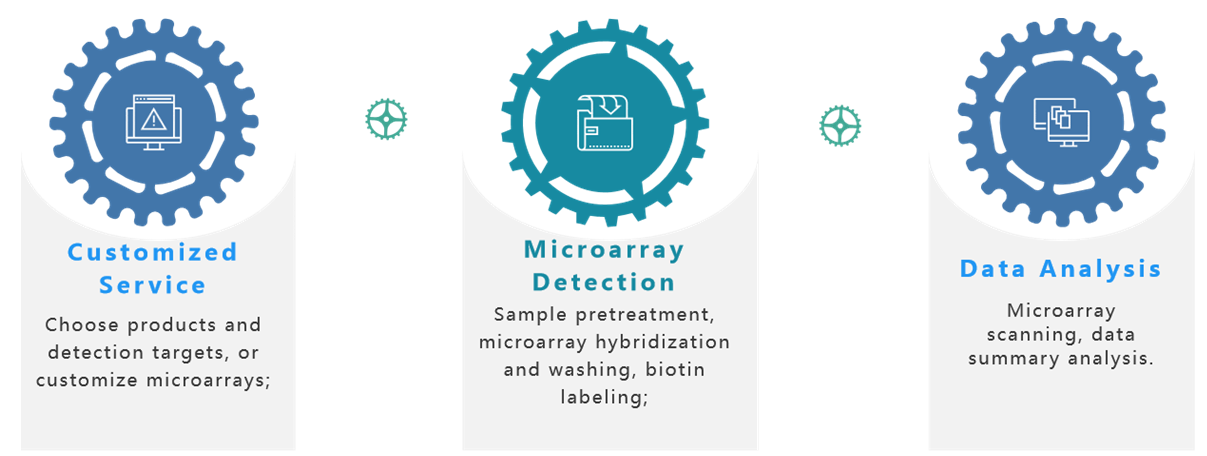As a leading service provider in the field of microarrays, Creative Proteomics is committed to the design and development of various effective biological microarrays for scientific research. Our microarray test platform provides a full range of microarray-based chemokine analysis and measurement services to help our global customers conduct relevant research and improve efficiency. With our time-tested capabilities and expertise, we are confident to provide you with quality services to escort your research.
Chemokine Profile Analysis
Chemokines and their receptors are widely involved in various pathophysiological processes such as cell growth, differentiation, apoptosis, tissue damage, tumor growth, and metastasis. In recent years, chemokines and their receptors have become attractive targets for regulating tumor cell migration in vivo. The control of cancer metastasis is essential to control the progression of cancer. Chemokines and their receptors are a superfamily of secreted small molecules that control the migration of many cell types in the body. The main biological functions of chemokines regulate the transport of leukocytes and their recruitment to inflammatory foci. The study of chemokine receptors plays an important and bidirectional role in the biological behavior of tumors. It can play an anti-tumor effect by chemotaxis, activating immune cells, or inhibiting blood vessel proliferation. In addition, it can also achieve the effect of promoting tumor growth, invasion, and metastasis by stimulating tumor growth, chemotaxis of tumor cells, promoting vascular proliferation, and promoting the degradation of the extracellular matrix.
Service Process
Determining the expression of multiple chemokines in a single sample may require specialized equipment, and performing multiple immunoprecipitations and western blots requires time and effort. The development of microarray technology has solved these problems. Using multiple antibody arrays to detect multiple chemokines in a single sample is cost-effective and saves time and samples. Chemokines belong to a class of cellular stress-related proteins. A membrane-based antibody array for parallel determination of the relative levels of selected human chemokines. Our chemokine profile analysis service can qualitatively and quantitatively analyze the components in liquid biological samples. Detection targets include, but are not limited to, analytes in cell culture supernatants, cell lysates, tissue lysates, serum, plasma, urine, saliva, and milk. The application scenarios of this detection method include multiple protein detection, detection of relative protein expression, biomarker/key factor screening, identification of key factors, and confirmation of biological processes. About 50 chemokine targets have been reported in human, mouse, or rat samples. In addition to choosing prefabricated microarray products, our microarray testing service can also customize target collections. You only need to select the desired detection target and select the product, and then send the sample to our laboratory. At the same time, we provide testing services combined with cytokines to realize the testing of multiple categories of items in a single submission of samples.
 Fig 1. Chemokine microarray service process.
Fig 1. Chemokine microarray service process.
Technical Advantages
Compared with analysis obtained by multiple single-target ELISA, immunoprecipitation, or Western blotting.
- The chemokines microarray can provide a broader view of the protein spectrum;
- The chemokines microarray time and labor costs;
- The reduced number of experiments by cytokine microarray can reduce human error.
Creative Proteomics provides high-quality microarray tools and convenient detection services for chemokines profile analysis. We have a large and well-equipped team of scientists who are committed to cooperating with researchers from all over the world. If you are interested in our one-stop solution service, please contact us for more detailed information.
References
- Miyazaki H, Takabe K, Yeudall W A. Chemokines, chemokine receptors and the gastrointestinal system[J]. World Journal of Gastroenterology: WJG, 2013, 19(19): 2847.
- Morein D, Erlichman N, Ben-Baruch A. Beyond cell motility: the expanding roles of chemokines and their receptors in malignancy[J]. Frontiers in Immunology, 2020, 11.
For research use only, not intended for any clinical use.

 Fig 1. Chemokine microarray service process.
Fig 1. Chemokine microarray service process.